The S.K Warne grandstand is a fitting honour but a Shane Warne Spin Academy is the concept Australia should back for its future and his legacy.
It was not simply a father, husband and icon that was lost last Friday, it was spin bowling’s greatest salesman, the loud, wise voice who convinced generations of youngsters there was no business like slow business.
Now that he is gone Australia must take measures to ensure his beautiful craft does not fade into history.
Now is the time for Australia to beef-up its coaching of slow bowlers.
You could name the project after Warne but would not call it a centre of excellence because Warne loathed that title.
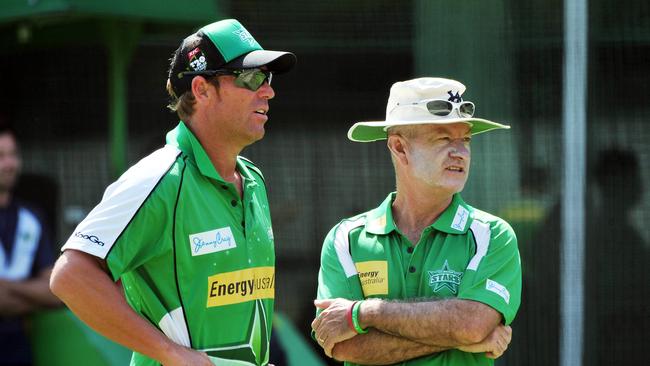
He always felt it sounded pompous and pretentious for players with so much to learn.
Warne always liked the word “Academy’’ more because it radiated a vibe of a work in progress.
Warne didn’t have to knock on anyone’s door or even open his mouth to sell his craft.
Much like Michael Jordan with basketball or Usain Bolt in athletics he just had to stand there to become a neon sign-like advertisement for his craft. No explanation required.
Everyone knew who he was and what he did.
In the months before Warne was selected for Australia for the first time in 1992 Jim Higgs said to his fellow national selectors John Benaud and Bob Simpson “look, if we choose this kid it will mean getting a leg-spinner on television … cricket needs it.
“Kids need to see it can be done and how to do it.’’
It was an easy sell.
John Benaud’s brother Richie was one of Australia’s greatest leggies and Simpson, like Higgs himself, bowled wrist spin at Test level.
Everyone loved a leggie. They still do. But loving them and finding them are two different things.
Mitchell Swepson’s likely debut on Saturday against Pakistan is a poignant moment because Warne was a fan and a relentless supporter of his cause.
But his selection should be a starting point not the end game.
It has been a staggeringly long 13 years since a specialist leggie played for Australia and that is too long given what a beautiful part of the game they are.
True, Nathan Lyon has done a superb job but it’s all about having options and Australia probably would have won not drawn the last two Sydney Tests if it had been bold enough to play a leg-spinner.
Australia spends some money teaching young spinners without having much success.
We don’t want to be England.
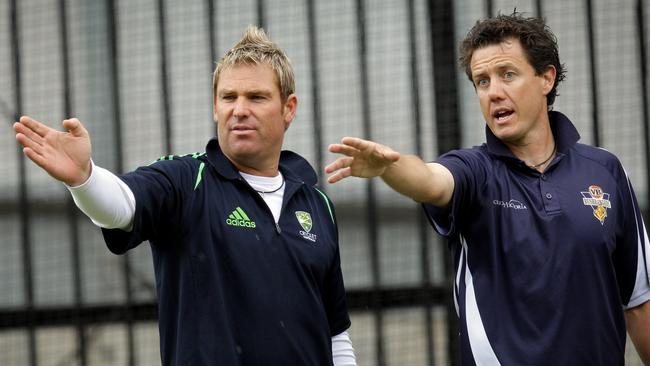
Decent leggies have often been the difference between Australia and England.
But they are hard to find and history tells us the truly exceptional ones come along about once every 35 years.
Australia’s honour roll of leg-spinning champions features Warne, Clarrie Grimmett, Bill O’Reilly, Stuart MacGill, and Benaud in 145 years of Test cricket.
Leggies tend to either play heaps of Tests or next to none.
Unlike fast bowlers who can exist in a grey zone, leggies, much like magicians, tend to either make it or they don’t.
Warne may have been a freak but some of his teachings were gold to leg-spinners of all standards and could be helpful in the teachings of any Academy which carries his name.
When lecturing youngsters he would tell them that, on average, he had to wait 57.4 balls for every Test wicket. “And I had a lot of success … if you haven’t got patience you have got nothing,’’ he would say.
Before Warne arrived leg-spinners were often described as the little guys who sat in the corner of the bar with a scotch and coke, lamenting that they couldn’t bowl on green wickets, or with a wet ball or on day one and they had a captain who didn’t understand them.
Warne change all that.
It’s wonderful that a grandstand at the MCG will be named in his hour but a grandstand never took a wicket with a flipper any carrying on his craft will be the greatest tribute Australian cricket could give to him.
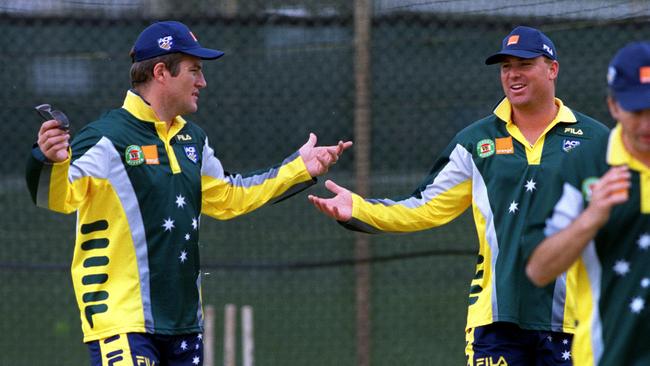
WARNIE’S ‘MR BEAN’ STORY YOU NEED TO READ
The story started with a desperate plea from desperate men …
There we were, a few Australian journalists around a pool at the team hotel in Chennai in 1998, lamenting the fact that we had run out of stories before the first Test against India when in walked the team physiotherapist, Errol “Hooter’’ Alcott.
“Hooter, anything doing – we’ve got absolutely nothing,’’ we asked to which, after a moment’s thought, he replied “no, everyone’s fit. All good. Nothing to report.’’
“But I will give it some thought for you. I’ll be back in a few minutes. I just have to rush off this fax to the ACB (Cricket Australia) about Warnie.’’
The ears pricked. Warnie?
“Yeah, he can barely eat the local food. He’s run out of baked beans and tinned spaghetti and we need emergency supplies sent over. We can’t have him undernourished. But story-wise, look I will have a think as see if there’s anything doing.’’
Mate, seriously, you’ve done your thinking.
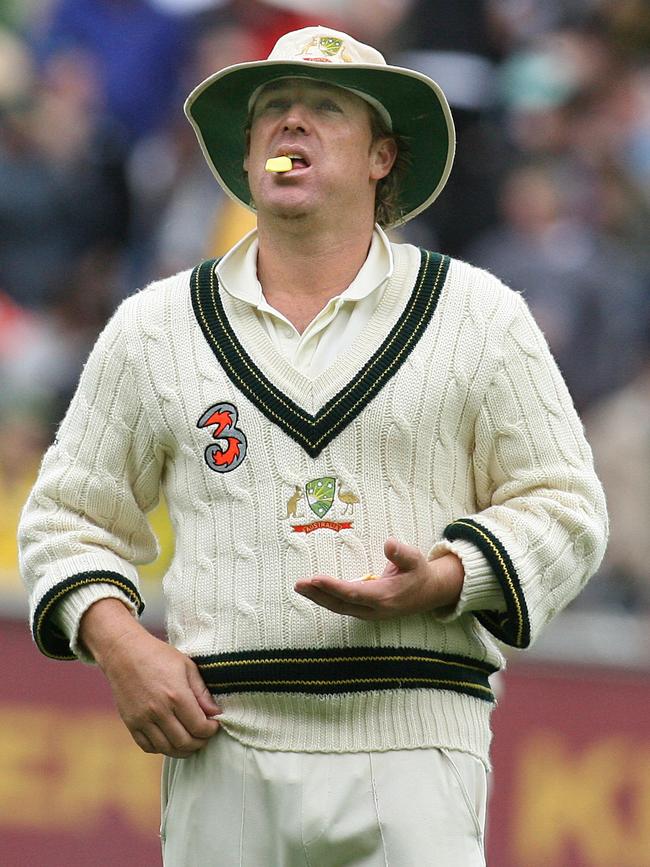
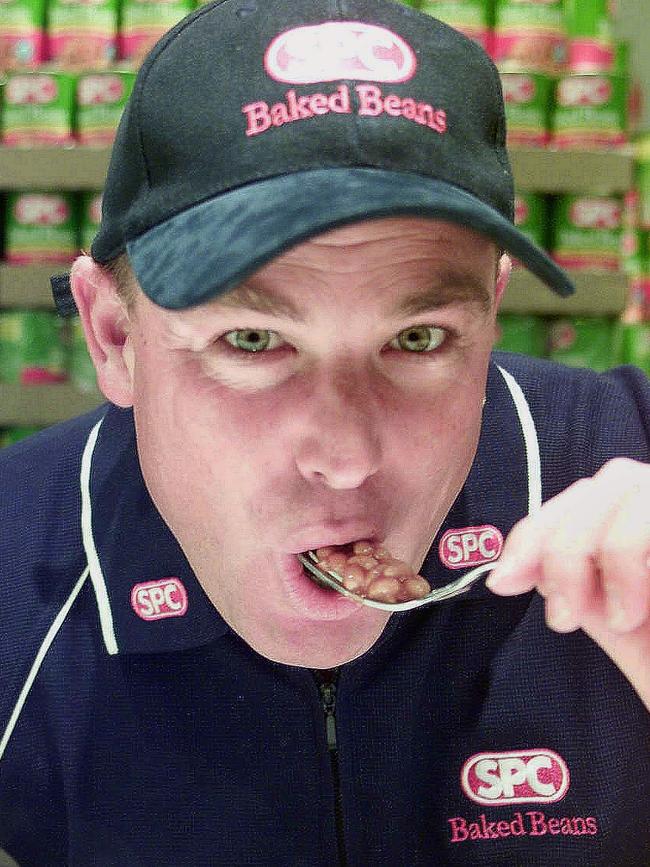
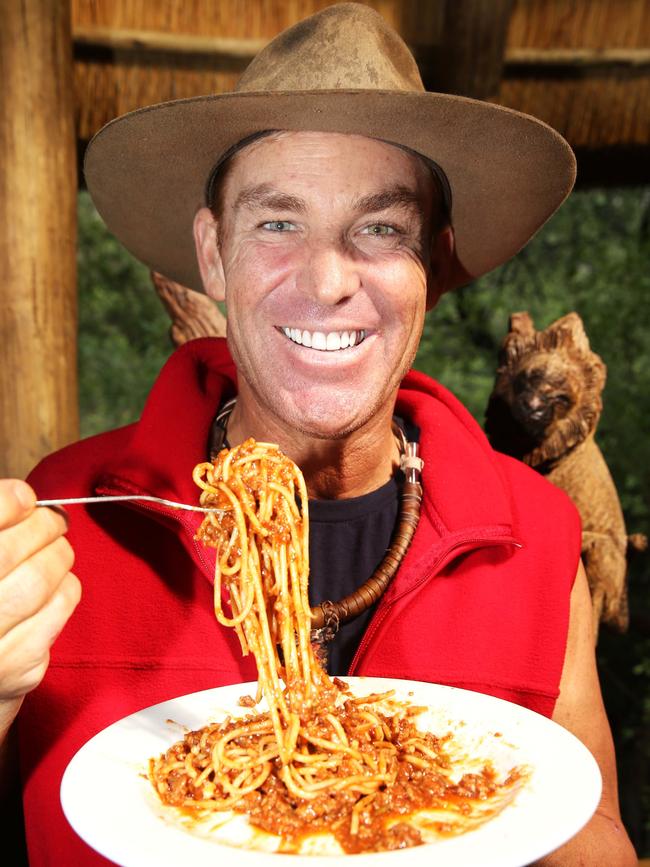
An electric current suddenly surged through the tiny group as we asked for permission to write it and Alcott, who never loved cricket but playfully enjoyed the theatre around it, said it would be fine so long as Warne agreed to it which he did instantly.
“Of course you should write it – I’m starving,’’ said Warne, then existing on a diet of naan bread and vegemite.
“Hopefully you can get something in the papers.’’
Leave it with us, we said. No promises but we’ll try our best (!).
The story about the emergency food request was sent back to Australia and artists at Melbourne’s Herald-Sun immediately went to work on a clever back page graphic illustration where Warne was being showered with baked bean cans under the iconic headline Mr Bean.
The then Herald Sun sports editor Phil Gardner rated it his favourite back page ever and soon had it framed and put on his office wall and 24 years later its still floating around in his home office.
But for the next 48 hours Warne’s world went crazy.
Heinz and SPC sent highly publicised crates of beans and spaghetti to India with the sort of urgency normally reserved for rations to war time troops.
There were photos of pack-ups at the airport with cricket spokesmen playfully declaring in Churchillian tones “the beans must get through.’’
For a while it was fun for everyone bar the man at the middle of it.
“This is complete madness – I wish I hadn’t said anything,’’ Warne said privately the next day. “My room phone is ringing off the hook. I pick up and people say “is that Mr Bean?’’
“I’ve got charity people and every radio station in the world trying to ring me. People are doing food drops at the hotel. You’ve taken this way too far.’’
But, as we pointed out, there was no denying he did want those beans.
“Yes, but a couple of cans not 2000 of them.’’
As all this was happening, Alcott was chuckling along at the sheer bizarreness of it, and urging journalists to make sure they did their duty and write follow ups tracking the beans’ journey from Melbourne.
Finally the beans arrived, Warne had his fill and took four wickets in the first innings but only 1-122 in the second as Australia lost the Test.
Indian journalists walking past our desks were quipping “so much for baked bean power … one second innings wicket.’’
We countered with “on the contrary … just as well they arrived otherwise he might have taken none-for.’’
Warne was told about the exchange later and smiled and soon after he had the biggest smile of all after signing a five figure contract to promote SPC baked beans with he did with the gusto of a man who truly loved his product.
Warnie was the winner after all … he normally was.
THE MEETING THAT TORE APART WARNE AND WAUGH
Shane Warne got used to rolling with the punches, but few things rocked him more than being sensationally axed from the Test team in the West Indies in 1999.
Tabloid stories about his love life upset him, a bookmaking scandal frustrated him, a year-long absence from the game for taking a diet drug left him empty and bewildered.
But only one event truly rocked his confidence as a bowler. That was being axed from the Test team when Australia was 2-1 down against the Windies with one Test to play.
Years later he admitted he took the decision badly, often retreating to the dressing room toilets for a consoling cigarette, and regretted not accepting it with more grace.
But it did, however, spur him to arguably the greatest achievement of his career – bowling a fractured Australian cricket team to a stunning World Cup victory in England later in the year.
Australia winning the 1999 World Cup with all the drama happening behind the scenes and internal infighting remains an achievement that still has players in the squad shaking their heads.
Generally, you need everything to right to win a World Cup. Australia had much go wrong and still got there.
Warne had just come back from shoulder surgery in the West Indies and, by his own admission, was bowling “ordinary’’ and his rival Stuart MacGill was bowling better.
But he was still Shane Warne. He was always likely to improve, which he did later that year.
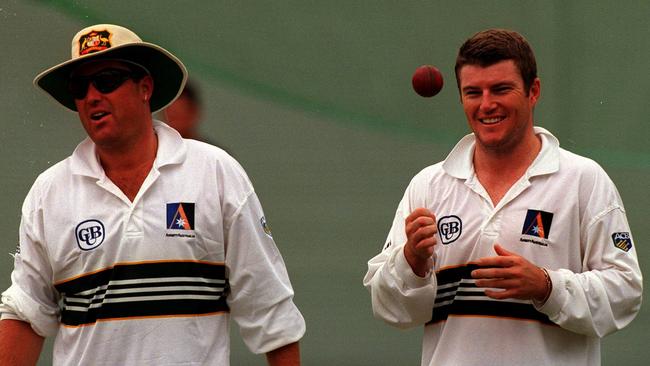
News of his axing could have been no more dramatic had it been the West Indies dropping Brian Lara.
For the first time, Warne doubted himself. He took special interest in newspaper stories sent back from Australia and once, when reading where Doug Walters said “Warnie would be in my team,’’ he was heard saying “I bloody love Dougie.’’
Warne even phoned the rooms of two touring Australian journalists after the decision and said “I need some perspective … just tell me straight … how am I bowling and would you have played MacGill instead?’’
One journalist told him he was unlucky. The other said MacGill deserved to play. Both urged him not to give up. But he was very down.
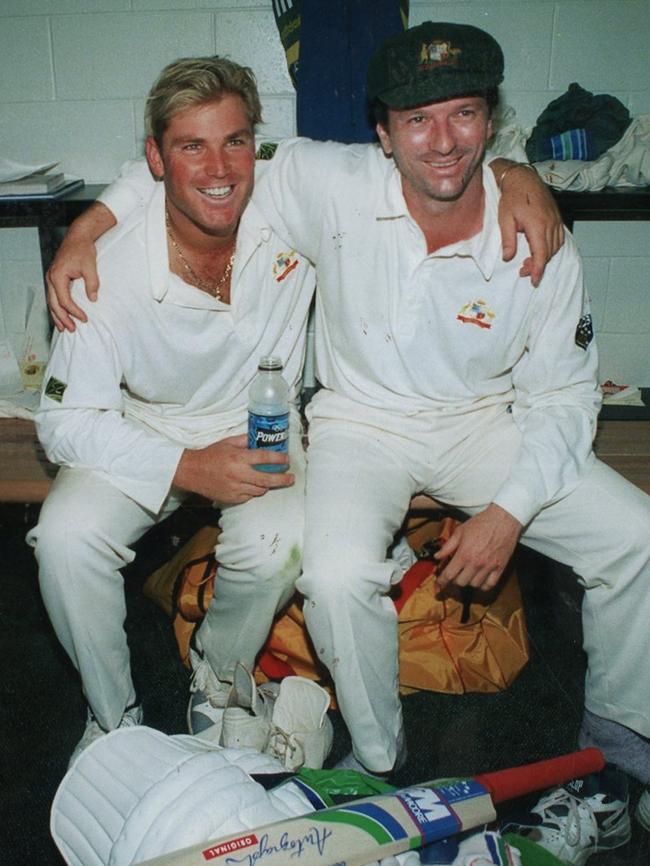
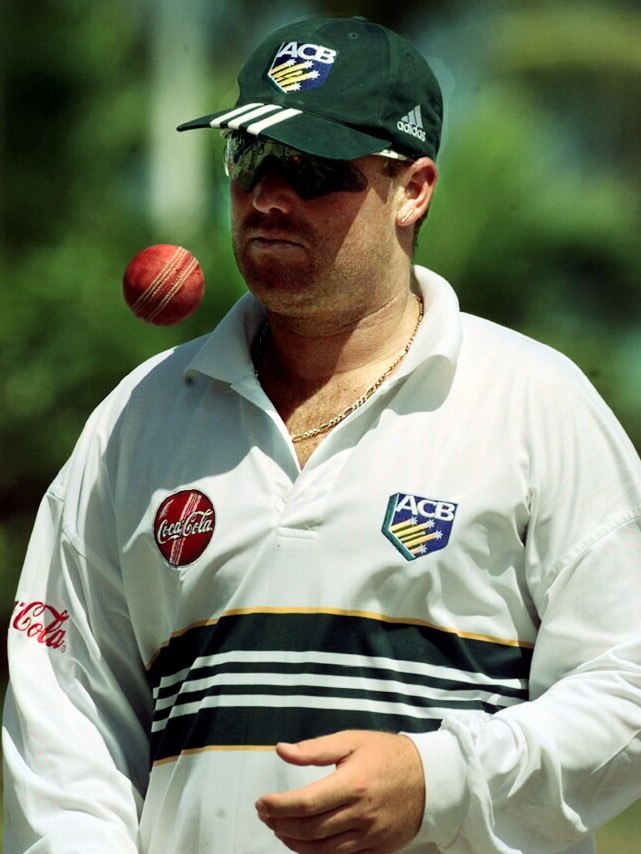
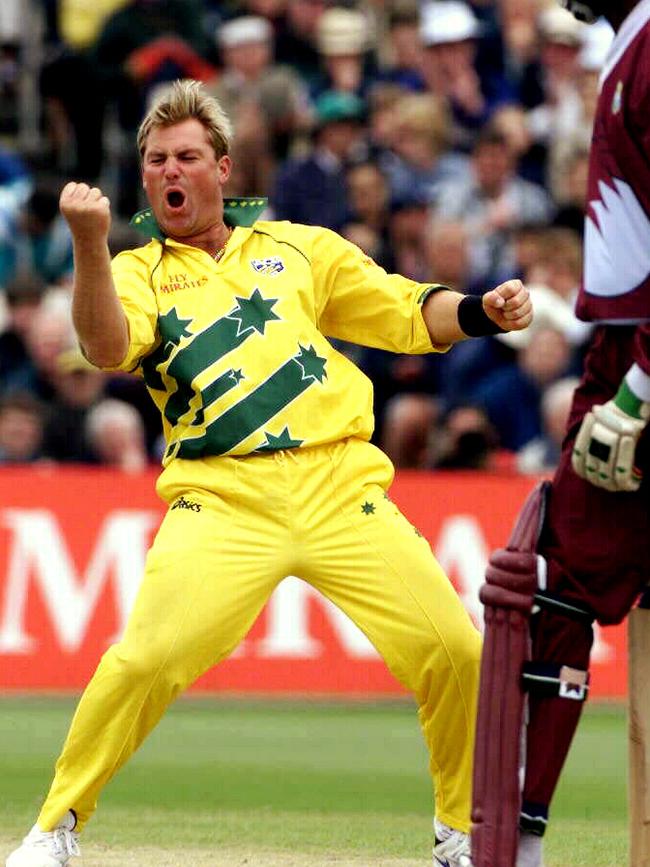
Warne was livid with captain Steve Waugh and although their families later had holidays together, their relationship never really recovered.
Vice-captain Warne was one of three selectors, with captain Waugh and coach Geoff Marsh.
Warne’s version of events that he walked into a selection meeting and Waugh opened up with the sentence “Warnie, I don’t think you should play the next Test.’’
Warne: “Err, right. Why?’’
Waugh: “I don’t think you’re bowling very well, mate.’’
Warne: “Yes … fair call. My shoulder is taking longer than I thought, but it is close now. The feel is slowly coming back and the then the rhythm will come mate, I’m not worried. The situation we are in is exactly when I performs my best. History proves that.’’
In his latest autobiography, Warne claims that Waugh said: “No mate, I am not so sure’’ then turned for the third and decisive opinion to Marsh who, Warne claimed, said Warne should play.
“Well, I am captain and I don’t agree,’’ Waugh allegedly said.
It was agreed to call in Allan Border, in town with a tour group, for his view.
Warne maintained Border said “I back Warnie every time. The situation is made for him. Anyway, we owe him.’’
But Waugh got his way.
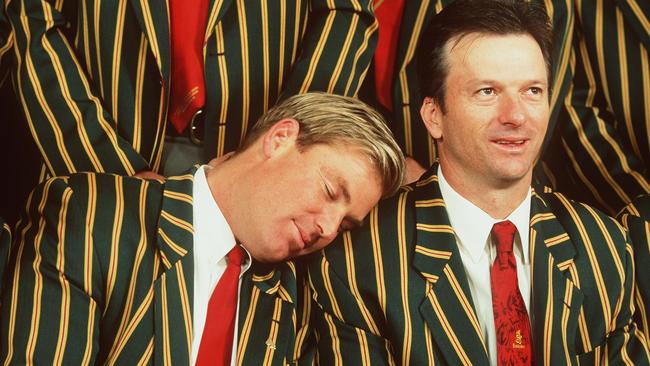
The thought of dropping Warne from any game was chastening, but Warne had taken just two wickets at 134 in the series and MacGill, who held his place for the fourth Test, which Australia won to square the series, finished with 12 at 29 playing all four games.
As strong as he was, even Border was rattled by the selection issue.
A journalist crossed paths with him as he was having a long walk on a beach in Antigua to clear his head. Border told them he felt awkward about the whole issue.
Warne admitted “part of me wanted to throw the towel in’’ that “I never found it easy with Steve Waugh after that’’ and that he had “pure anger bubbling at Steve’s lack of trust.’’
But ultimately the decision made him realise how much he missed the game, and it brought a renewed focus.
Warne went to England for the World Cup later in the year in a brittle state. He saw a team psychologist on tour. He seemed down. He was down.
But slowly he regained his mojo. Australia needed to go undefeated in the last seven games to take the title, and somehow they did it.
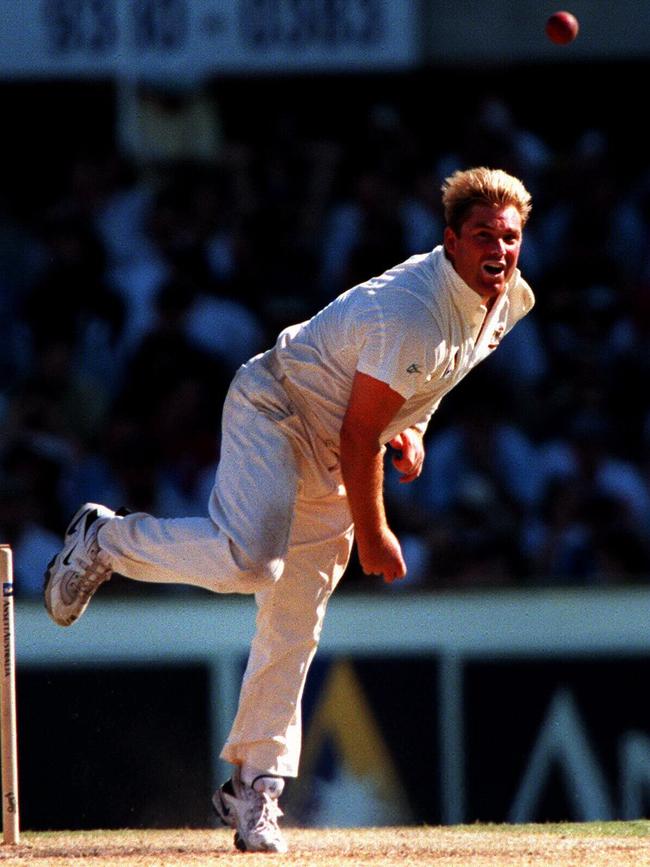
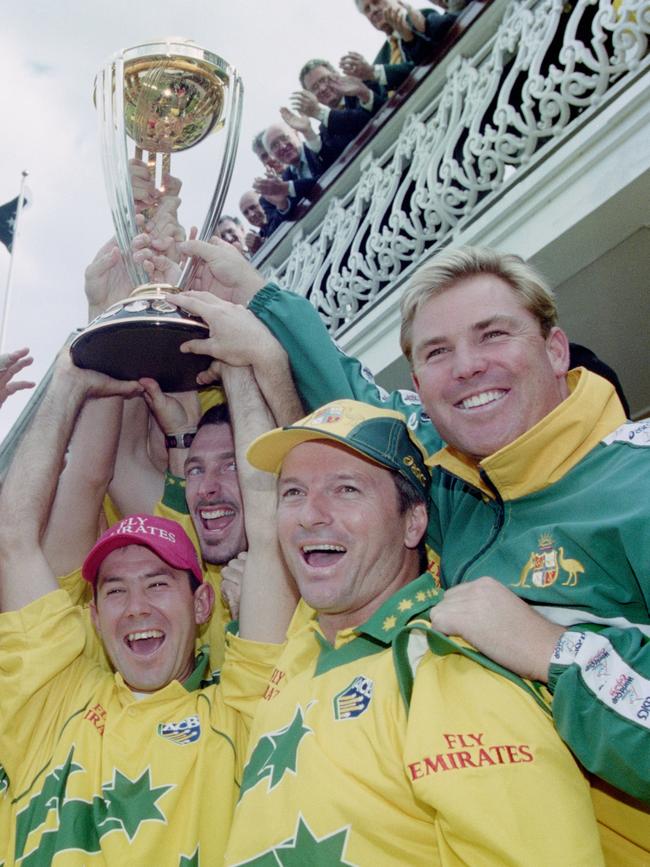
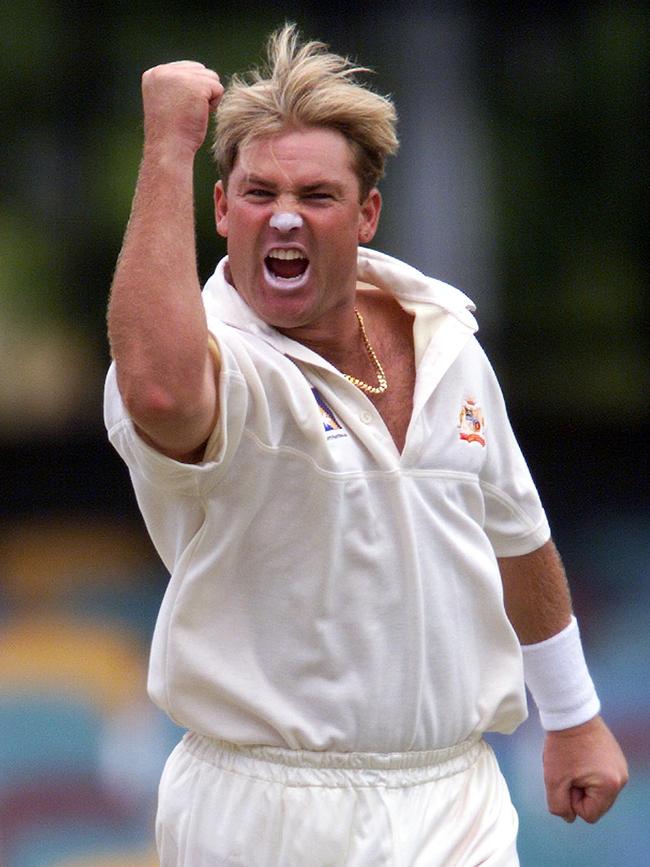
Warne took a walk with the gods of slow bowling in the quarter-final against South Africa at Edgbaston when Australia scored just 213 and Warne was tossed the ball with South Africa having cruised to 0-43.
He then produced the greatest salvage operation of his career as he thought “stuff the shoulder – let’s get us back in to the game’’.
“It went like this. I bowled Herschelle Gibbs with a Gatting ball, then I ripped one through Gary Kirsten before knocking over Hansie Cronje. Eight overs, 3-12, that is as good as I can do. We were back in the game and I could sense I was dragging the boys with me, to believe that a place in the World Cup final was still on.’’
And it was. And they won it despite the fact that Warne’s relationship with Waugh was never the same.
Both men were outstanding in that tournament. They put aside their personal grievances to help the team cause, a lesson that any team in any sport could learn from.
‘Money well spent’: Warnie’s wild Ferrari ride
Few people knew Shane Warne as well as his former Victorian teammate Merv Hughes. In the first of a special Robert Craddock series remembering the spin king, Crash speaks to Hughes about the Warnie he knew and the wild raffle prize he knew he couldn’t renege on.
Merv Hughes’ favourite Shane Warne story involves a kindergarten auction, a 180kph Ferrari ride but, most of all, a kept promise.
Hughes was in a state of numb disbelief at the death of his trusted old friend and Australian and Victorian teammate on Saturday. Warne adored Hughes and the respect was mutual.
“I just sat there when I heard the news and was just hopeful it was a prank,’’ Hughes told News Corp.
“I’m absolutely devastated. I met him as a 19-year-old. People think he is how he is because of what he has done. It’s completely the opposite.
“He did what he did because that is who he is and who he has always been. In 33 years he never changed from that brash, confident 19-year-old I first saw down the nets at the Junction Oval.
“He was one of the most loyal people you would ever meet. Just a great person.’’
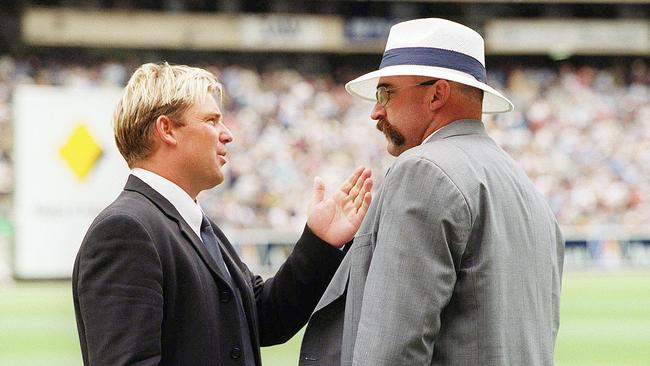
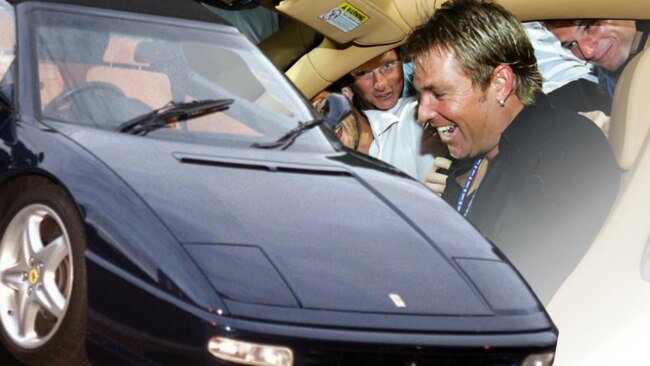
Hughes often talks about the time he was asked to get Warne to offer a game of golf as an auction item to raise funds for his daughter Madeline’s kindergarten a couple of decades ago.
Warne threw in a ride in his Ferrari as well but such was his schedule that it took three years to align the planets for Warne to deliver the two experiences – but he got there in the end.
Hughes eventually met Warne and the white-faced but exhilarated auction winner for a drink after their Ferrari ride around Melbourne.
“The guy said ‘I have never gone around the ring road at 180kph before … it was money well spent.’ I guess I can tell that story now because the police can’t do anything about it.
“At the end of the night Warnie said to me that he had been wanting to sell the Ferrari for two years but had decided not to until he kept his promise to take the auction winner for a ride. He said “if I say I will do something I will do it.’ That was who he was.’’
Hughes quips that with Warne stories there are rumours, myths and the truth and “the truth is by far the most interesting stuff.’’
Like the famous stories about Warne’s early food preferences.
“He liked what he liked. I remember going to a team dinner with him before one of his early Sheffield Shield games. We were at an Italian restaurant but he did not like the herb bread because he didn’t like herbs or the spaghetti because it had mushrooms in it which couldn’t be taken out.
“So he went for a smoke and ordered a Margarita pizza in from another restaurant which was brought in. He had the confidence to do that in one of his first Shield games. No guilt whatsoever. I mean who is this kid?
“As Tony Dodemaide said “he just packed so much in his 52 years.’’ If there was one bloke who was going to live forever we thought it would be Shane Warne.’’

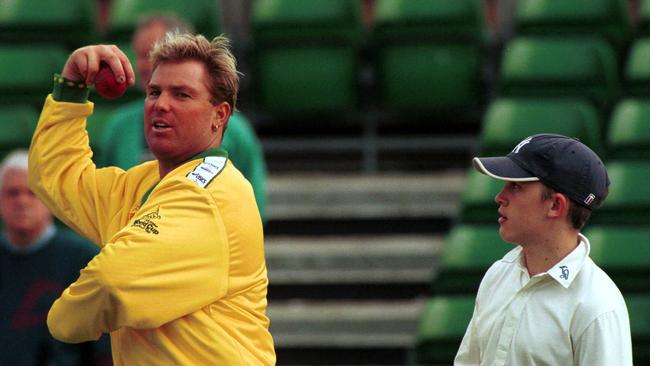
Add your comment to this story
To join the conversation, please log in. Don't have an account? Register
Join the conversation, you are commenting as Logout
Aussie presenter returns serve on nepo critics
Australian sports presenter Grace Hayden has delivered a clear cut message to those who doubt her and her rise in the game.
Lyon says Poms starting to copy Aussies
Test cricket's most successful off-spinner has fired the first Ashes salvo, declaring England's famous Bazball strategy has transformed into an Australian copycat.